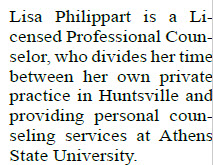Anger Reduction – Mental Health Minute
 By: Lisa Philippart
By: Lisa Philippart
This is the final article in a three-part series on anger. The first article addressed the etiology of anger. The second explained how anger affects your health. Today we will look at methods of understanding and hopefully decreasing your anger response. If we were in a counseling session, these articles represent the path we would take…moving from what anger is, to what anger does, to “now what do I do about it?”

Probably the most important key to understanding and modifying your anger is to first acknowledge that you might have a problem. As we have explored, anger is unhelpful and unhealthy in many ways, mainly because it is an ineffective way of operating in the (social) world. Anger can occasionally backfire, and often ruins relationships. In my opinion, anger is essentially an intimidation strategy. Surveys tell us that about 80% of our day-to-day anger occurs with family and those who are important to us. I think most of us realize, though, that being assertive, calm, and caring is much more effective in getting people to “behave” correctly. So, our first step is understanding that anger might be an issue for you. My favorite counseling phrase, “Awareness is the first step,” would apply here.


If you have acknowledged that anger is a problem for you, then let’s start by monitoring your “ire.” Keep an anger log over a three-week period, documenting every anger episode. Write down the facts of what happened; the intensity of the anger 0-10, with 10 being maximum rage; any thoughts, images or memories that were stirred up by the incident; and what you actually did to express your anger. This habit can, at a minimum, help you to gain some insight and perspective into what happens to you in those moments of outburst. Taking this a step further, you could even have someone record some of the incidents. Have you ever watched or listened to yourself get angry, while you’re not angry? When you are able to rationally examine the facts and take a few moments to look at exactly what happened, you may be able to ask appropriate questions of interpretation: Are you sure you understood his position? Is it fair to say that she is always late, or never does anything nice for you? Are you positive that he passed by and snubbed you, or did he just not see you? Why not suspend judgment pending further evidence?
The most important takeaway from this article is in understanding the ultimate source of your anger. In my opinion, that source is “shoulding.” Most people think that other people’s behaviors and words are what makes them angry. But there is no single event that always angers everyone all the time, nor is there any single event that never angers anyone any of the time. You don’t get angry from the external events alone; your anger comes from how you appraise the events. I believe that anger always involves viewing behavior as wrong, or not as it should be. For example, your daughter chooses to text at the dinner table, which is irritating to you, causing you to become angry. Maybe your other family members aren’t irritated and don’t even care. If your daughter’s phone use at the table annoys you, it’s because you believe that family members should interact at the dinner table. I will add one other piece of advice: When you feel anger, you can choose to not do anything in the moment. Ambrose Bierce, an American satirist, stated, “Speak when you are angry, and you will make the best speech you will ever regret.”
By: Lisa Philippart
Licensed Professional Counselor